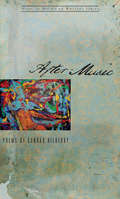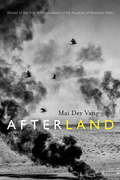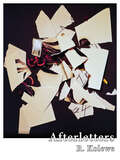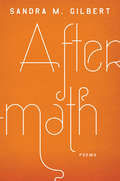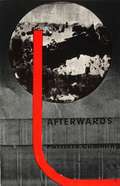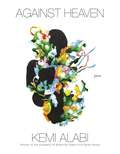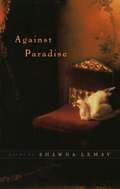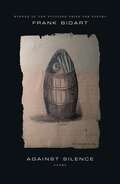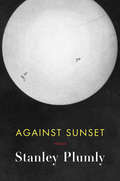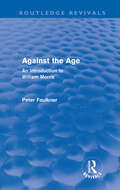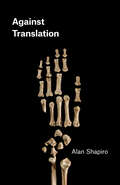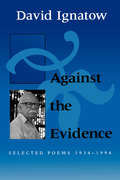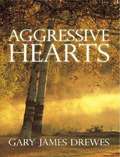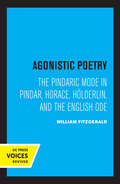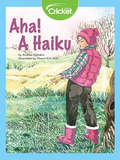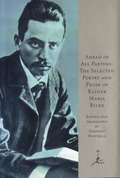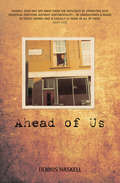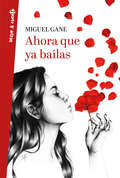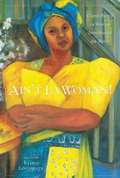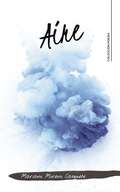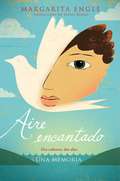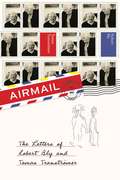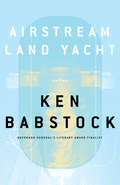- Table View
- List View
After-Music: After-music
by Conrad HilberryA new collection by esteemed Michigan poet Conrad Hilberry, his sixth full-length book of poetry.
Afterland: Poems
by Mai Der VangThe 2016 winner of the Walt Whitman Award of the Academy of American Poets, selected by Carolyn ForchéWhen I make the crossing, you must not be taken no matter whatthe current gives. When we reach the camp,there will be thousands like us.If I make it onto the plane, you must follow me to the roadsand waiting pastures of America.We will not ride the water today on the shoulders of buffaloas we used to many years ago, nor will we foragefor the sweetest mangoes.I am refugee. You are too. Cry, but do not weep.—from “Transmigration”Afterland is a powerful, essential collection of poetry that recounts with devastating detail the Hmong exodus from Laos and the fate of thousands of refugees seeking asylum. Mai Der Vang is telling the story of her own family, and by doing so, she also provides an essential history of the Hmong culture’s ongoing resilience in exile. Many of these poems are written in the voices of those fleeing unbearable violence after U.S. forces recruited Hmong fighters in Laos in the Secret War against communism, only to abandon them after that war went awry. That history is little known or understood, but the three hundred thousand Hmong now living in the United States are living proof of its aftermath. With poems of extraordinary force and grace, Afterland holds an original place in American poetry and lands with a sense of humanity saved, of outrage, of a deep tradition broken by war and ocean but still intact, remembered, and lived.
Afterletters
by R. KoleweLovers wrote letters. Letters crossed absence, longing, joy, passion, loss and heartbreak. Sometimes letters were answered. Sometimes not. And sometimes not for years, but then – In 1948, in the exhausted aftermath of WWII, the poets Paul Celan and Ingeborg Bachmann met in Vienna. They began a difficult and intense but intermittent relationship which lasted until the early 1960s, broken off only when Bachmann could no longer deal with Celan's increasing mental instability. And yet, despite the break, the relationship continued to haunt both of them.In Afterletters, R. Kolewe weaves together fragments of letters and other works of these two poets, to give us a stunning sequence of poems that explore the traces of loss and love, in language that breaks, recombines and scintillates, "star-crossed, star-covered, star-thrown."
Aftermath: Poems
by Sandra M. Gilbert"Sandra Gilbert's poems are beautifully situated at the intersection of craft and feeling."--Billy Collins The title of this collection--at times mournful, sardonic, and joyous--refers to the grief in the wake of loss. Yet these poems aren't just about the consequences of loss but also about the complex experiences of endurance, acquiescence, and rebirth that, with luck, mark the aftermath of sorrow. from "Aftermath: Kite" But the thought is only paper after all, a soul that clings to a stick, tears open, shreds as if it's flung to the ground in a final shiny fall, and at last the line goes limp, the climbing ends. Beyond the rush & sweep, an arc of silence-- though a mind imagined this flight, & proved it once.
Afterwards
by Patricia Cumming"All the poems are about survival. Patricia Cumming speaks with unblinking carefulness." --New: American and Canadian Poetry
Against Heaven: Poems
by Kemi AlabiWinner of the Academy of American Poets First Book Award, selected by Claudia Rankine. Kemi Alabi’s transcendent debut reimagines the poetic and cultural traditions from which it is born, troubling the waters of some of our country’s central and ordained fictions—those mythic politics of respectability, resilience, and redemption. Instead of turning to a salvation that has been forced upon them, Alabi turns to the body and the earth as sites of paradise defined by the pleasure and possibility of Black, queer fugitivity. Through tender love poems, righteous prayers, and vital provocations, we see the colonizers we carry within ourselves being laid to rest.Against Heaven is a praise song made for the flames of a burning empire—a freedom dream that shapeshifts into boundless multiplicities for the wounds made in the name of White supremacy and its gods. Alabi has written an astonishing collection of magnificent range, commanding the full spectrum of the Black, queer spirit’s capacity for magic, love, and ferocity in service of healing—the highest power there is.
Against Paradise
by Shawna LemayShawna Lemay’s rich, amused, insistent, ingenious meditation on Venice will surprise readers with its peculiar grace. Here is the work of an elegant raconteur; a self-effacing, sharp-eared occupier of voices; a high-toned, compassionate gossip. From many mouths, she offers us the city, doomed, full of light. Lemay’s Venice is a small, crowded community of the delightfully eccentric dead. Through her quirky dramatic monologues, each one shimmering with a companionable intelligence, we meet them – George Eliot, Peggy Guggenheim, Lord Byron, Mary Shelley, Effie Ruskin, Ernest Hemingway, Titian, various unnamed others; we meet them in mid-speech; it seems they have never stopped talking, talking, telling now (or refusing still to tell) their secrets, protecting their vanities still, finally saying what they truly think. Lemay has given us an entire world, dark, haughty, watery, beautiful, full of voices, sedimented with stories.
Against Silence: Poems
by Frank BidartAn urgent new collection from the winner of the Pulitzer Prize and the National Book Award and “one of the undisputed master poets of our time” (Craig Morgan Teicher, NPR)Words, voices reek of the worlds from which theyemerge: different worlds, each with its all but palpablearoma, its parameters, limitations, promise.Words—there is a gap, nonetheless alwaysand forever, between words and the world—slip, slide, are imprecise, BLIND, perish. •Set up a situation,—. . . then reveal an abyss.For more than fifty years, Frank Bidart has given voice to the inner self, to the depths of his own psyche and the unforgettable characters that populate his poems. In Against Silence, the Pulitzer Prize winner’s eleventh collection of poetry, Bidart writes of the cycles we cannot escape and the feelings we cannot forget. Our history is not a tabula rasa but a repeating, refining story of love and hate, of words spoken and old cruelties enacted. Moving among the dead and the living, the figures of his life and of his past, Bidart calls reality forth—with nothing settled and nothing forgotten, we must speak.
Against Sunset: Poems
by Stanley PlumlyA powerful new volume from the National Book Award finalist that demonstrates how the lyric is essentially elegiac. Whether addressing the deaths of friends and other poets or celebrating the closing of the day and the autumn of the seasons, Against Sunset reveals Stanley Plumly at his most personal and intimate. As much an homage to the rich tradition of the Romantics as it is a meditation on memory itself, these poems live at the edges of disappearances. From "Against Sunset" The horizon, halfway disappeared between above and below-- night falls too or does it also rise out of the death-glitter of water? And if night is the long straight path of the full moon pouring down on the face of the deep, what makes us wish we could walk there, like a flat skipped stone?
Against The Age: An Introduction to William Morris (Routledge Revivals)
by Peter FaulknerStudents new to the work of William Morris will find the full range of his achievements covered in this reissue of Peter Faulkner's excellent biography, first published in 1980. The author has carefully placed Morris in the context of the Victorian age, but has also suggested the relevance of his ideas today. The six chapters are organised biographically and cover all aspects of Morris’s work in poetry, fiction, design and socialist politics. The emphasis is on his continuous struggle against the age in which he lived, seen as an idealism which went through various stages from the wistfulness of The Earthly Paradise through the practical activities of the firm of Morris & Company to the socialism of Morris's later years. The book quotes freely from writings by Morris which are not easily accessible and gives an overall account from which the student can develop his specialist interests. This reissue will appeal to sixth-formers and undergraduates interested in the Victorian period, as seen through one of its most striking personalities. When this book appeared in 1980, Morris’s reputation had risen again after the low estimates of the interwar period. This was due both to the reappraisal of his politics and to the expanding popularity of his designs. Against the Age offers a clear account of Morris’s career for those developing an interest in his numerous achievements. It covers the whole range of Morris’s work, and argues for his significance as a writer of both poetry and prose. Since 1980 our knowledge of Morris has been enriched by the publication of Norman Kelvin’s edition of his Collected Letters, by the late Nicholas Salmond’s editions of his contributions to the socialist journals, by Fiona MacCarthy’s biography of 1984, and by the increasing recognition of Morris as a pioneer of environmentalism. However, the book retains its value for its wide coverage and its balanced attitude to Morris’s achievements, and for its encouragement to readers to consider the issues that make Morris of continuing importance today.
Against Translation (Phoenix Poets)
by Alan ShapiroWe often ask ourselves what gets lost in translation—not just between languages, but in the everyday trade-offs between what we experience and what we are able to say about it. But the visionary poems of this collection invite us to consider: what is loss, in translation? Writing at the limits of language—where “the signs loosen, fray, and drift”—Alan Shapiro probes the startling complexity of how we confront absence and the ephemeral, the heartbreak of what once wasn’t yet and now is no longer, of what (like racial prejudice and historical atrocity) is omnipresent and elusive. Through poems that are fine-grained and often quiet, Shapiro tells of subtle bereavements: a young boy is shamed for the first time for looking “girly”; an ailing old man struggles to visit his wife in a nursing home; or a woman dying of cancer watches her friends enjoy themselves in her absence. Throughout, this collection traverses rather than condemns the imperfect language of loss—moving against the current in the direction of the utterly ineffable.
Against the Evidence: Selected Poems, 1934–1994 (Wesleyan Poetry Series)
by David IgnatowFor over half a century, David Ignatow has crafted spare, plain, haunting poetry pf working life, urban images, and dark humor. The poetic heir of Whitman and William Carlos Williams, Ignatow is characteristically concerned with human mortality and human alienation in the world: the world as it is, defined by suffering and despair, yet at crucial times redeemed by cosmic vision and shared lives. His development as a poet is chronicled in Against the Evidence, title of the poem in part quoted above and meant by Ignatow as the metaphor for the whole body of his work.Where his previous collections have been organized thematically, Ignatow here arranges his poems "according to the decade in which they were written…returning each to its chronological order." Against the Evidence charts the evolution of his themes from the earliest origin in the Thirties to their present extraordinary manifestation in a variety of poetic forms and modes.
Against the Tide: The Story of Watchman Nee
by Angus KinnearThe engrossing, moving biography of one of China's better-known Christians, the dedicated evangelist and gifted Bible teacher Watchman Nee.
Aggressive Hearts
by Gary James DrewesA series of rhyme and poems on healing and resolving feelings. These topics are on the angst, grief and hurt parts of life. All the aggressive issues presented in rhymes and poems. To take the hurt, loss, fear and pain and with rhyme bring some issues around to healing and resolve as each person heals and resolves at their own pace. These poems and rhymes are only another focus and feeling of the resolving process. Please enjoy your visit.
Agonistic Poetry: The Pindaric Mode in Pindar, Horace, Hölderlin, and the English Ode
by William FitzgeraldThis title is part of UC Press’s Voices Revived program, which commemorates University of California Press’s mission to seek out and cultivate the brightest minds and give them voice, reach, and impact. Drawing on a backlist dating to 1893, Voices Revived makes high-quality, peer-reviewed scholarship accessible once again using print-on-demand technology. This title was originally published in 1993.
Aha! A Haiku
by Andrea VlahakisLearn more about haiku, which are short poems, written in a style created in Japan more than 400 years ago.
Ahead of All Parting
by Rainer Maria Rilke Stephen MitchellThe reputation of Rainer Maria Rilke has grown steadily since his death in 1926; today he is widely considered to be the greatest poet of the twentieth century. This Modern Library edition presents Stephen Mitchell's acclaimed translations of Rilke, which have won praise for their re-creation of the poet's rich formal music and depth of thought. "If Rilke had written in English," Denis Donoghue wrote in The New York Times Book Review, "he would have written in this English." Ahead of All Parting is an abundant selection of Rilke's lifework. It contains representative poems from his early collections The Book of Hours and The Book of Pictures; many selections from the revolutionary New Poems, which drew inspiration from Rodin and Cezanne; the hitherto little-known "Requiem for a Friend"; and a generous selection of the late uncollected poems, which constitute some of his finest work. Included too are passages from Rilke's influential novel, The Notebooks of Malte Laurids Brigge, and nine of his brilliant uncollected prose pieces. Finally, the book presents the poet's two greatest masterpieces in their entirety: the Duino Elegies and The Sonnets to Orpheus. "Rilke's voice, with its extraordinary combination of formality, power, speed and lightness, can be heard in Mr. Mitchell's versions more clearly than in any others," said W. S. Merwin. "His work is masterful."
Ahead of Us
by Dennis Haskellbut in fact / we are as we are / together, alone, as you can see, / with elusive memories for company, /with your wisps of hair / disappearing as gently as breath. 'After Chemo' Ahead of Us is Dennis Haskell's eighth book of poetry. Dedicated to his wife Rhonda, who lost her battle with cancer after a long illness, Ahead of Us contains poems of love, of two people forging a partnership together and of the inevitable end of that partnership when one person dies. It is a celebration of life and and of the fragile thread that holds us here.
Ahora que ya bailas
by Miguel GaneEl nuevo poemario del autor de Con tal de verte volar, Miguel Gane. Naces, creces, amas, te rompen, aprendes y no mueres hasta que alguien deja de quererte. Estos poemas son la historia de Ella, la que fue callada porque sus gritos resonaban demasiado alto. Ella, que dejó de ser suya porque quien debía liberar su sonrisa, la acabó enjaulando y aplastando contra el asfalto. Sola, fue capaz de levantarse, de mirar a la cara a su pasado y decirle: «No me has vencido, soy indestructible». Ahora que ya bailas, el mundo entero va a quedarse a tus pies y donde antes había silencio ahora habrá música. La tuya.
Ahora que ya bailas
by Miguel GaneEl nuevo poemario del autor de Con tal de verte volar, Miguel Gane. Naces, creces, amas, te rompen, aprendes y no mueres hasta que alguien deja de quererte. Estos poemas son la historia de Ella, la que fue callada porque sus gritos resonaban demasiado alto. Ella, que dejó de ser suya porque quien debía liberar su sonrisa, la acabó enjaulando y aplastando contra el asfalto. Sola, fue capaz de levantarse, de mirar a la cara a su pasado y decirle: «No me has vencido, soy indestructible». Ahora que ya bailas, el mundo entero va a quedarse a tus pies y donde antes había silencio ahora habrá música. La tuya.
Ain't I a Woman!: Classic Poetry by Women from Around fhe World
by Illona LinthwaiteSpanning the centuries from Sappho's Greece to modern South Africa, the voices of these women poets express themes of love, motherhood, injustice, loss, and racial and sexual oppression. Featured writers include Maya Angelou, Alice Walker, Audre Lorde, Nikki Giovanni, and Marge Piercy.
Aire
by Mariano Moreno CasqueteEl recuerdo es un impostor que nos desafía desde el otro lado del espejo. El poemario Aire se compone de cuatro partes: el ruido del tiempo, viento, destiempo y soñado perdido y ajeno. La ausencia del amor, una ausencia que no es solo recuerdo, también es niebla o aire que no se desvanece del todo. Un fantasma, una realidad a destiempo, un espejismo... No es posible encontrar ningún espejo que refleje el humo, y el recuerdo se ha convertido en humo, en un impostor que nos observa y nos desafía desde el otro lado del espejo, porque uno es ya otro cuando recuerda.
Aire encantado: Dos culturas, dos alas: Una Memoria
by Margarita Engle Alexis RomayIn this poetic memoir, which won the Pura Belpré Author Award and was named a Walter Dean Myers Award Honoree, acclaimed author Margarita Engle tells of growing up as a child of two cultures during the Cold War. En este poético libro de memorias—ganador del premio Pura Belpré de autor, finalista del premio de YALSA de no ficción y premio de honor Walter Dean Myers—la aclamada autora Margarita Engle recrea su infancia, que transcurrió a caballo entre dos culturas durante la Guerra Fría.Margarita is a girl from two worlds. Her heart lies in Cuba, her mother’s tropical island country, a place so lush with vibrant life that it seems like a fairy tale kingdom. But most of the time she lives in Los Angeles, lonely in the noisy city and dreaming of the summers when she can take a plane through the enchanted air to her beloved island. Words and images are her constant companions—sources of comfort when the children at school are not. Then a revolution breaks out in Cuba. Margarita fears for her far-away family. When the hostility between Cuba and the United States erupts into the Bay of Pigs Invasion, Margarita’s worlds collide in the worst way possible. How can the two countries she loves hate each other so much? And will she ever get to visit her beautiful island again? Margarita es una niña de dos mundos. Su corazón está en Cuba, la isla tropical de su mamá, un sitio tan exuberante, de una vida tan intensa, que parece el reino de un cuento de hadas. Pero la mayor parte del tiempo, vive en Los Ángeles, sola en la bulliciosa ciudad, soñando con los veranos, en los que puede montarse en un avión y viajar por el aire encantado a su amada isla. Las palabras y las imágenes son compañeras constantes, amistosas y reconfortantes, mientras que los niños en la escuela no lo son. Entonces estalla una revolución en Cuba. Margarita teme por su familia lejana. Cuando la hostilidad entre Cuba y Estados Unidos se desata en la invasión de Bahía de Cochinos, los mundos de Margarita chocan de la peor manera posible. ¿Cómo es posible que los dos países que ella quiere se odien tanto mutuamente? ¿Y podrá volver a visitar su hermosa isla de nuevo?
Airmail: The Letters of Robert Bly and Tomas Transtromer
by Robert Bly Tomas TranstromerThe illuminating letters of the National Book Award winning poet Robert Bly and the Nobel Prize winning poet Tomas TranströmerOne day in spring 1964, the young American poet Robert Bly left his rural farmhouse and drove 150 miles to the University of Minnesota library in Minneapolis to obtain the latest book by the young Swedish poet Tomas Tranströmer. When Bly returned home that evening with a copy of Tranströmer's The Half-Finished Heaven, he found a letter waiting for him from its author.With this remarkable coincidence as its beginning, what followed was a vibrant correspondence between two poets who would become essential contributors to global literature. Airmail collects more than 290 letters, written from 1964 until 1990, when Tranströmer suffered a stroke that has left him partially paralyzed and diminished his capacity to write. Across their correspondence, the two poets are profoundly engaged with each other and with the larger world: the Vietnam War, European and American elections, and the struggles of affording a life as a writer. Airmail also illuminates the work of translation as Bly began to render Tranströmer's poetry into English and Tranströmer began to translate Bly's poetry into Swedish. Their collaboration quickly turned into a friendship that has lasted fifty years.Insightful, brilliant, and often funny, Airmail provides a rare portrait of two artists who have become integral to each other's particular genius. This publication marks the first time letters by Bly and Tranströmer have been made available in the United States.
Airstream Land Yacht
by Ken BabstockFrom the author of the award-winning The Sisters Brothers comes a dark, boozy, and hilarious tale from the LA underworld.A nameless barman tends a decaying bar in Hollywood and takes notes for a book about his clientele. Initially, he is morbidly amused by watching the regulars roll in and fall into their nightly oblivion, pitying them and their loneliness. In hopes of uncovering their secrets and motives, he establishes tentative friendships with them. He also knocks back pills indiscriminately and treats himself to gallons of Jameson's. But as his tenure at the bar continues, he begins to lose himself, trapped by addiction and indecision. When his wife leaves him, he embarks on a series of squalidly random sexual encounters and a downward spiral of self-damage and irrational violence. To cleanse himself and save his soul, he attempts to escape …
